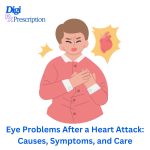
A heart attack affects more than just the heart—it can also impact blood circulation, nerve function, and vision. Many people experience eye problems after a heart attack, including blurry vision, double vision, or even vision loss. Understanding these issues can help with early detection and proper management.
How a Heart Attack Affects the Eyes
Since the eyes rely on healthy blood circulation, any disruption can lead to temporary or permanent vision issues.
Common Eye Problems After a Heart Attack
| Eye Problem | Cause | Symptoms | Treatment |
|---|---|---|---|
| Blurry Vision | Poor blood circulation | Difficulty focusing, hazy sight | Eye rest, blood pressure control |
| Double Vision (Diplopia) | Nerve damage, stroke risk | Seeing two images of one object | Eye exercises, prescription lenses |
| Vision Loss (Partial or Complete) | Blood clots, retinal artery occlusion | Sudden blindness in one or both eyes | Emergency medical care |
| Retinopathy (Damaged Blood Vessels in the Eye) | High blood pressure, diabetes | Dark spots, vision distortion | Lifestyle changes, medication |
| Eye Floaters | Blood vessel changes | Small moving spots in vision | Usually harmless, but needs monitoring |
| Optic Nerve Damage | Oxygen deprivation, stroke | Pain, vision loss | Neurological treatment, eye care |
Why Do Eye Problems Occur After a Heart Attack?
1️⃣ Poor Blood Circulation – The eyes need oxygen-rich blood. A heart attack can disrupt blood flow, leading to vision problems.
2️⃣ High Blood Pressure – Hypertension (often linked to heart disease) damages blood vessels in the eyes, increasing the risk of retinopathy.
3️⃣ Stroke Risk – A heart attack raises the risk of strokes, which can affect the optic nerve or visual processing areas in the brain.
4️⃣ Medication Side Effects – Some heart medications (like blood thinners and beta-blockers) can cause dry eyes, blurry vision, or dizziness.
Warning Signs That Require Immediate Medical Attention
???? Sudden vision loss in one or both eyes
???? Persistent blurry or double vision
???? Severe eye pain or pressure
???? Flashing lights or increased floaters
???? Drooping eyelid (possible stroke sign)
Some conditions, like retinal artery occlusion, need urgent treatment to prevent permanent vision loss.
How to Protect Eye Health After a Heart Attack
✔ Manage Blood Pressure & Cholesterol – Keep blood vessels healthy to reduce eye complications.
✔ Control Diabetes (if applicable) – High blood sugar worsens retinopathy and nerve damage.
✔ Stay Active – Exercise improves circulation, benefiting both heart and eye health.
✔ Eat a Heart-Healthy Diet – Include leafy greens, fish, nuts, and whole grains to support vascular health.
✔ Get Regular Eye Exams – Detects early signs of damage to eye blood vessels.
✔ Follow Medication Guidelines – Take heart meds as prescribed but report any side effects to your doctor.
Conclusion
Vision problems after a heart attack are not uncommon and may signal circulatory issues or stroke risk. Monitoring eye symptoms, managing cardiovascular health, and seeking prompt medical care can help protect your sight and overall well-being. If you experience sudden vision loss, pain, or changes in vision, consult a cardiologist and an eye specialist immediately.
References:
-
American Heart Association (AHA) – Heart disease and vision loss – https://www.heart.org
-
National Eye Institute (NEI) – Eye health and cardiovascular conditions – https://www.nei.nih.gov
-
Mayo Clinic – Stroke and vision problems – https://www.mayoclinic.org
